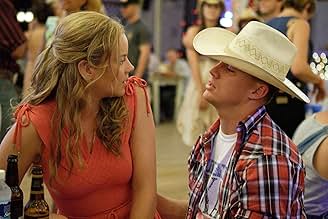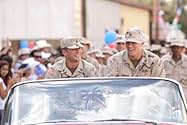CALIFICACIÓN DE IMDb
6.4/10
21 k
TU CALIFICACIÓN
Un soldado veterano regresa de su período de servicio en Irak, pero su vida da un vuelco cuando el ejército le ordena arbitrariamente volver al campo de batalla.Un soldado veterano regresa de su período de servicio en Irak, pero su vida da un vuelco cuando el ejército le ordena arbitrariamente volver al campo de batalla.Un soldado veterano regresa de su período de servicio en Irak, pero su vida da un vuelco cuando el ejército le ordena arbitrariamente volver al campo de batalla.
- Dirección
- Guionistas
- Elenco
- Premios
- 2 premios ganados y 5 nominaciones en total
Connett Brewer
- Curtis
- (as Connett M. Brewer)
- Dirección
- Guionistas
- Todo el elenco y el equipo
- Producción, taquilla y más en IMDbPro
Opiniones destacadas
Maybe the idea was to show the total hopelessness of the conflict--that it was not really a war but urban warfare, and that there is no way to win or to have a happy ending. But that's just an idea--it's not a movie.
I thought that the set-up was fine. But I am not sure the filmmakers knew where to go with it. Their take on the stop-loss policy is obvious, and it is a message that should be heard. But I think the film would have been more interesting if any character exhibited any real growth during the film. The vets were all depicted as basket cases--the most well-adjusted vet seemed to be the double-amputee--he told us why he would want to go back to Iraq and there was at least some productive purpose that would have been served by his return there.
Perhaps there are soldiers who don't mind being stop-lossed--who truly believe they are accomplishing something positive over there. It would have been refreshing to have a character like that--a non-basket case. It would have been good to hear arguments supporting the stop-loss program (if there are any).
The last 20-30 minutes of this film were baffling. The end of the film (not an ending, just an end) was very unsatisfying.
Ryan Philippe did a competent job, but rarely conveyed anything not apparent from the lines or situation. For example, you could see that a lot of his post-war angst was attributable to guilt. How that tied in with the ending is just a mystery to me.
I recall that a very similar military policy was explored by Joseph Heller in Catch-22. I think a comparison to that novel and film is more apt than comparing this to The Deer Hunter.
I wish this film could have been much better than it was.
I thought that the set-up was fine. But I am not sure the filmmakers knew where to go with it. Their take on the stop-loss policy is obvious, and it is a message that should be heard. But I think the film would have been more interesting if any character exhibited any real growth during the film. The vets were all depicted as basket cases--the most well-adjusted vet seemed to be the double-amputee--he told us why he would want to go back to Iraq and there was at least some productive purpose that would have been served by his return there.
Perhaps there are soldiers who don't mind being stop-lossed--who truly believe they are accomplishing something positive over there. It would have been refreshing to have a character like that--a non-basket case. It would have been good to hear arguments supporting the stop-loss program (if there are any).
The last 20-30 minutes of this film were baffling. The end of the film (not an ending, just an end) was very unsatisfying.
Ryan Philippe did a competent job, but rarely conveyed anything not apparent from the lines or situation. For example, you could see that a lot of his post-war angst was attributable to guilt. How that tied in with the ending is just a mystery to me.
I recall that a very similar military policy was explored by Joseph Heller in Catch-22. I think a comparison to that novel and film is more apt than comparing this to The Deer Hunter.
I wish this film could have been much better than it was.
'Stop-Loss' deals with the problems soldiers have in getting out of the army; both through the technical procedure of "Stop-Loss", whereby a solider is sent back for a second consecutive tour of duty, but also through the difficulties of adjusting to civilian life after time on the front line. Many dramas set after the Vietnam war explored the idea that the sense of a victory well won (absent then, as now) might be critical to enabling a soldier to make the transition from combat animal back to member of civic society. The film is well made, powerfully acted, and doesn't pretend that it's characters are angels (although it justly acknowledges their bravery). But it doesn't really go very far beyond its premise, and the ending is given a slightly more upbeat (but inconclusive) spin than could have been applied. The final credits remind us of the startling high number of American troops to have fought in Afghanistan or Iraq in the 21st century; wars that are fought (for good or bad) while the rest of us get on with our lives in an altogether easier place.
Kimberly Peirce becomes one of the latest directors to try and only marginally succeed in making a compelling film about the Iraq conflict.
Peirce takes on as her subject the military's stop-loss clause, essentially a back door draft by which the military can use fine print in recruits' contracts to prevent them from getting out once their time is up. Peirce obviously feels strongly about the policy, but what should be a hard-hitting drama feels instead like a rather preachy after-school special. She coaxes a nice performance out of Ryan Phillipe, as the soldier who goes AWOL when his stop-loss clause is activated, but she doesn't fare as well with the rest of the cast. The film suffers from confusing editing, that doesn't always make it clear where characters are or how events are related to one another, and the writing at times is weak as well, with character motivations not coming across as clearly as they should.
I don't know what it is about the Iraq conflict that makes it so hard for filmmakers to make good movies about it. Maybe it will have to be over for a while before anyone can begin to approach it with any success.
Grade: B-
Peirce takes on as her subject the military's stop-loss clause, essentially a back door draft by which the military can use fine print in recruits' contracts to prevent them from getting out once their time is up. Peirce obviously feels strongly about the policy, but what should be a hard-hitting drama feels instead like a rather preachy after-school special. She coaxes a nice performance out of Ryan Phillipe, as the soldier who goes AWOL when his stop-loss clause is activated, but she doesn't fare as well with the rest of the cast. The film suffers from confusing editing, that doesn't always make it clear where characters are or how events are related to one another, and the writing at times is weak as well, with character motivations not coming across as clearly as they should.
I don't know what it is about the Iraq conflict that makes it so hard for filmmakers to make good movies about it. Maybe it will have to be over for a while before anyone can begin to approach it with any success.
Grade: B-
Well intentioned, this film tells the fictional story of Brandon King (Ryan Phillippe), an American soldier who, after successfully completing a heroic but horrendous tour of duty in Iraq, is notified that, despite his wishes, he must return to Iraq for yet more combat duty, a real-life contingency called "stop-loss". It's a fate that neither King, nor real-life soldiers, want or deserve, but which the U.S. government justifies in lieu of a wartime draft.
The film's first few minutes provide a montage of images and scenes showing King, and his men, in Iraq, as they bond together as protective buddies, and as they endure a violent urban ambush, during which several buddies get killed or seriously wounded.
Back home in Texas, King and a couple of his men briefly celebrate their hero status. But life for them quickly deteriorates, as their wartime trauma leaves both physical and mental scars. And then, King gets his "stop-loss" notice. This sets up the rest of the film's plot.
The theme here is obvious. The brave soldier, having endured more than enough danger and trauma, is still just a powerless individual. As such, he or she is caught between having to resubmit to the horrors of war, or submit to a perilous and life-altering AWOL status in the U.S., or elsewhere, forever on the run from an overpowering American political system. It's a timely and worthy subject for a film.
That much effort and care went into the creation of the film, from background research to attention to detail in costumes, production design, and military protocol is obvious.
And the film's color cinematography also is quite good. There are lots of close-ups, to get a feel for what the characters are going through. Many scenes feature natural lighting, used in clever ways. At times, the film has an almost documentary look and feel. Acting is overall credible. I especially liked the performances of Linda Emond, as King's mom, and Abbie Cornish, as a young woman who tries to help King.
The major problem is the script. Characters are rather stereotyped and two-dimensional. The plot is fairly predictable. And the story and its attendant theme are a tad too direct. I could have wished for a little more depth, and a plot twist or two. The film's ending is not very satisfying.
Yet, "Stop-Loss" is a noble effort to document the brutality not only of war but also of an American government that uses, then basically throws away, people, to ensure the preservation of an American war industry and continued power of faceless bureaucrats and corrupt politicians.
The film's first few minutes provide a montage of images and scenes showing King, and his men, in Iraq, as they bond together as protective buddies, and as they endure a violent urban ambush, during which several buddies get killed or seriously wounded.
Back home in Texas, King and a couple of his men briefly celebrate their hero status. But life for them quickly deteriorates, as their wartime trauma leaves both physical and mental scars. And then, King gets his "stop-loss" notice. This sets up the rest of the film's plot.
The theme here is obvious. The brave soldier, having endured more than enough danger and trauma, is still just a powerless individual. As such, he or she is caught between having to resubmit to the horrors of war, or submit to a perilous and life-altering AWOL status in the U.S., or elsewhere, forever on the run from an overpowering American political system. It's a timely and worthy subject for a film.
That much effort and care went into the creation of the film, from background research to attention to detail in costumes, production design, and military protocol is obvious.
And the film's color cinematography also is quite good. There are lots of close-ups, to get a feel for what the characters are going through. Many scenes feature natural lighting, used in clever ways. At times, the film has an almost documentary look and feel. Acting is overall credible. I especially liked the performances of Linda Emond, as King's mom, and Abbie Cornish, as a young woman who tries to help King.
The major problem is the script. Characters are rather stereotyped and two-dimensional. The plot is fairly predictable. And the story and its attendant theme are a tad too direct. I could have wished for a little more depth, and a plot twist or two. The film's ending is not very satisfying.
Yet, "Stop-Loss" is a noble effort to document the brutality not only of war but also of an American government that uses, then basically throws away, people, to ensure the preservation of an American war industry and continued power of faceless bureaucrats and corrupt politicians.
Just saw this film in an advance screening and once the tension and threat (very real) of the opening battle scenes were borne and past, the film grew on me, as the story became one of the soldiers at home: their war aftermath and their war that just won't quit or let them go.
It occurred to me at one point this was quite like watching a "Deer Hunter" for the Iraq war. There were certainly similar aspects, including aspects of the soldiers' relationships with each other and with others at home, and in terms of the casualties and injuries that continue to pile up well after leaving the battlefield.
Stop Loss is perhaps a more political film than the "Deer Hunter" was, because of the timing of its release, while the issues of the war in the film are still very much on the boil in the USA. I think it intends to position itself in a relevant and timely place, and time will tell whether it has staying power as a lasting and powerful war or antiwar film.
There is enough humanity, good drama and strong acting in this picture that it may deserve a place in the lineup of memorable or important American war films.
It occurred to me at one point this was quite like watching a "Deer Hunter" for the Iraq war. There were certainly similar aspects, including aspects of the soldiers' relationships with each other and with others at home, and in terms of the casualties and injuries that continue to pile up well after leaving the battlefield.
Stop Loss is perhaps a more political film than the "Deer Hunter" was, because of the timing of its release, while the issues of the war in the film are still very much on the boil in the USA. I think it intends to position itself in a relevant and timely place, and time will tell whether it has staying power as a lasting and powerful war or antiwar film.
There is enough humanity, good drama and strong acting in this picture that it may deserve a place in the lineup of memorable or important American war films.
¿Sabías que…?
- TriviaThe title refers to a provision in all military service contracts that says a service member can be involuntarily extended beyond their discharge (from active duty) date, and at times beyond their final discharge from service date, according to the needs of the service.
- ErroresWhen Sgt. King visits Rico, as he pushes his wheel chair out of the sun you can clearly see a bulge in Rico's t-shirt where his real arm is resting.
- Citas
[from trailer]
Passport Issuer: Here's your new ID. If you go, you're gone for good.
- Bandas sonorasCourtesy of the Red, White and Blue (The Angry American)
Written by Toby Keith
Selecciones populares
Inicia sesión para calificar y agrega a la lista de videos para obtener recomendaciones personalizadas
Detalles
Taquilla
- Presupuesto
- USD 25,000,000 (estimado)
- Total en EE. UU. y Canadá
- USD 10,915,744
- Fin de semana de estreno en EE. UU. y Canadá
- USD 4,555,117
- 30 mar 2008
- Total a nivel mundial
- USD 11,212,953
- Tiempo de ejecución
- 1h 52min(112 min)
- Color
- Mezcla de sonido
- Relación de aspecto
- 1.85 : 1
Contribuir a esta página
Sugiere una edición o agrega el contenido que falta





































